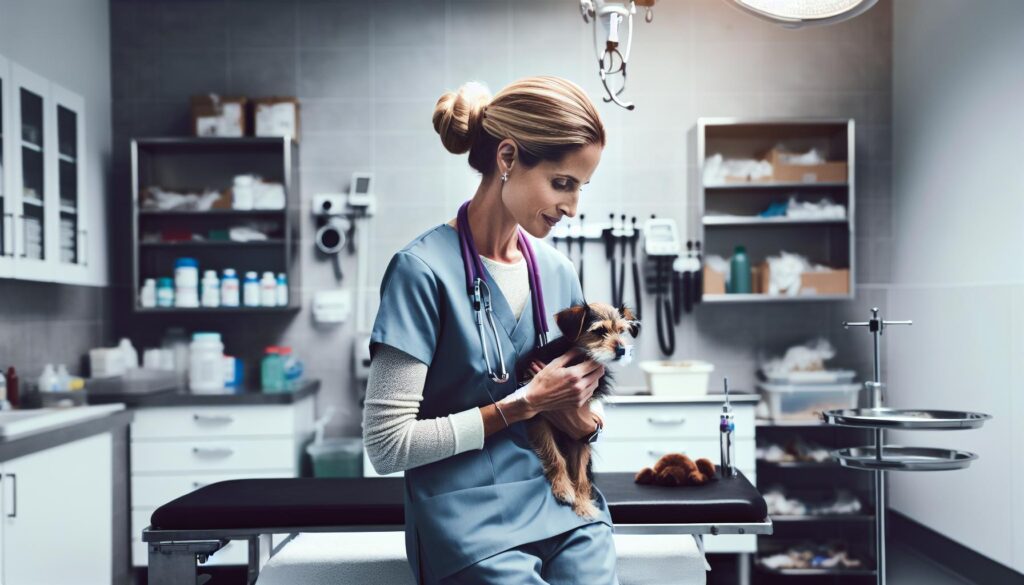Veterinary technicians play a crucial role in animal healthcare across Pennsylvania, working alongside veterinarians to provide essential medical care for pets and livestock. As the demand for qualified vet techs continues to grow, many aspiring professionals wonder about the earning potential in this rewarding field. In Pennsylvania, vet tech salaries can vary significantly based on factors like experience, location, and workplace setting. Whether working in private clinics, emergency animal hospitals, or research facilities, these skilled professionals earn competitive wages while making a difference in animals’ lives. Understanding the salary landscape helps individuals make informed decisions about pursuing a career in veterinary technology within the Keystone State.
How Much Does A Vet Tech Make in PA
Veterinary technicians in Pennsylvania serve as skilled healthcare professionals who perform essential medical procedures in veterinary practices. The role combines technical expertise with hands-on animal care in various clinical settings.
Required Education and Certification
Pennsylvania vet techs need an associate degree from an AVMA-accredited veterinary technology program. Here’s what’s required:
- Complete a 2-year veterinary technology program
- Pass the Veterinary Technician National Examination (VTNE)
- Obtain state certification from the Pennsylvania Veterinary Medical Board
- Complete 16 hours of continuing education every 2 years
- Maintain active certification through timely renewals
- Collect laboratory samples including blood draws urine specimens
- Monitor vital signs during surgical procedures
- Administer medications vaccines anesthesia
- Perform dental cleanings radiographs ultrasounds
- Assist in surgical procedures patient prep recovery
- Maintain medical records inventory supplies
- Perform initial patient assessments triage cases
- Execute diagnostic tests analyze laboratory results
- Provide post-operative care wound management
- Educate pet owners about treatments medications
| Task Category | Percentage of Daily Work |
|---|---|
| Clinical Procedures | 40% |
| Laboratory Work | 25% |
| Patient Care | 20% |
| Administrative Tasks | 15% |
Average Salary Range for Vet Techs in PA

Veterinary technicians in Pennsylvania earn competitive salaries that vary based on experience level, location, and workplace setting. The salary data reveals distinct ranges for professionals at different career stages.
Entry-Level Salaries
Entry-level vet techs in Pennsylvania earn an average starting salary of $31,200 annually. Urban areas like Philadelphia and Pittsburgh offer starting salaries up to $34,500, while rural regions typically start at $29,800. Recent graduates with specialized certifications in areas like dentistry or emergency care command 5-10% higher starting wages.
| Experience Level | Annual Salary | Hourly Rate |
|---|---|---|
| 0-2 years | $31,200 | $15.00 |
| Urban Areas | $34,500 | $16.60 |
| Rural Areas | $29,800 | $14.30 |
Experienced Vet Tech Earnings
Experienced vet techs with 5+ years in Pennsylvania earn an average of $45,800 annually. Senior technicians in specialty practices earn up to $52,000, while those in emergency animal hospitals make $48,500. Additional certifications increase earnings by $2,000-$4,000 annually.
| Experience Level | Annual Salary | Hourly Rate |
|---|---|---|
| 5+ years | $45,800 | $22.00 |
| Specialty Practice | $52,000 | $25.00 |
| Emergency Care | $48,500 | $23.30 |
Factors Affecting Vet Tech Salaries in Pennsylvania
Several key elements influence veterinary technician compensation in Pennsylvania, creating significant variations in earning potential across the state.
Geographic Location
Pennsylvania’s metropolitan areas, including Philadelphia, Pittsburgh and Allentown, offer higher vet tech salaries than rural regions. Urban vet techs earn 15-25% more than their rural counterparts due to increased cost of living and higher demand for veterinary services. Cities with specialized veterinary practices pay premium rates, with Philadelphia-based vet techs earning an average of $42,500 annually compared to $35,800 in rural central Pennsylvania.
Work Setting and Facility Type
The workplace environment directly impacts a vet tech’s earning potential in Pennsylvania. Here’s how different settings affect salaries:
| Facility Type | Average Annual Salary | Additional Benefits |
|---|---|---|
| Emergency Animal Hospitals | $48,200 | Night differential pay |
| Specialty Clinics | $45,900 | Performance bonuses |
| Private Practices | $41,300 | Health insurance |
| Animal Shelters | $35,600 | Paid time off |
| Research Facilities | $43,800 | Research stipends |
Specialty practices focusing on areas like oncology, cardiology or neurology typically offer higher compensation packages. Emergency facilities provide additional compensation for overnight shifts, weekend coverage and holiday work. Research facilities often include educational benefits and opportunities for advancement in specialized fields.
Benefits and Compensation Packages
Veterinary technicians in Pennsylvania receive comprehensive benefits packages alongside their base salaries. These packages vary by employer type and location, with larger facilities typically offering more extensive benefits.
Healthcare and Insurance
Pennsylvania veterinary clinics provide health insurance coverage for full-time vet techs, including medical, dental and vision plans. Corporate veterinary groups offer premium coverage with lower deductibles, averaging $1,500 annually. Many facilities cover 70-80% of insurance premiums while employees contribute the remaining portion. Additional insurance benefits include:
- Life insurance policies ranging from $25,000 to $50,000
- Short-term disability coverage at 60% of base salary
- Long-term disability protection after 90 days
- Optional pet insurance discounts of 15-25%
- 10 paid vacation days for first-year employees
- 5 paid sick days annually
- 8 paid holidays
- 401(k) retirement plans with 3-6% employer matching
- Continuing education allowances of $500-$1,000 yearly
- Employee discounts of 20-50% on veterinary services
- Flexible scheduling options in 24-hour facilities
- Uniform allowances of $200-300 annually
- Performance-based bonuses ranging from $500-$2,000
Career Growth and Advancement Opportunities
Veterinary technicians in Pennsylvania access multiple paths for career advancement through specialization certifications. The National Association of Veterinary Technicians in America (NAVTA) recognizes 16 specialty areas, including emergency care, dentistry, anesthesia, internal medicine, surgery, behavior, and clinical practice.
Specialization Options and Salary Impact
Specialized vet techs earn 20-35% more than general practice technicians:
| Specialization | Average Annual Salary |
|---|---|
| Emergency/Critical Care | $52,400 |
| Anesthesia | $49,800 |
| Surgery | $48,600 |
| Internal Medicine | $47,500 |
| Dentistry | $46,900 |
Leadership Roles and Management Positions
Experienced vet techs advance into supervisory positions:
- Lead Technician: Oversees daily operations with a $5,000-$8,000 annual salary increase
- Department Manager: Manages specific hospital areas with a $10,000-$15,000 annual salary increase
- Practice Manager: Coordinates entire facility operations with potential earnings of $65,000-$80,000
Additional Career Paths
Veterinary technicians expand their careers through diverse roles:
- Teaching positions at veterinary technology programs
- Research facilities conducting clinical trials
- Pharmaceutical sales representatives
- Laboratory animal medicine specialists
- Corporate training coordinators
- Pennsylvania Veterinary Medical Association workshops
- Online continuing education platforms
- Professional networking events
- Mentorship programs with experienced technicians
- Industry conferences offering certification courses
A career as a veterinary technician in Pennsylvania offers promising financial prospects and abundant growth opportunities. With competitive starting salaries competitive benefits packages and multiple paths for advancement it’s an attractive profession for those passionate about animal healthcare. The combination of steady job growth increasing demand and opportunities for specialization makes this career path particularly appealing in Pennsylvania’s veterinary healthcare sector. Whether working in urban or rural settings vet techs can build rewarding careers while making a meaningful impact on animal welfare. For those considering this profession the investment in education and certification can lead to a stable and financially rewarding career with extensive possibilities for professional development and increased earning potential.



